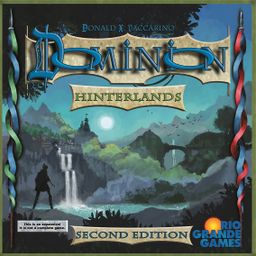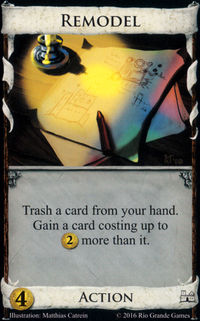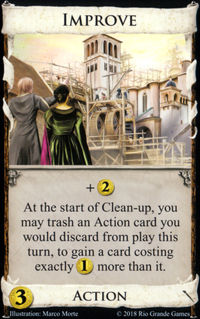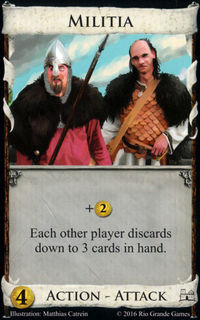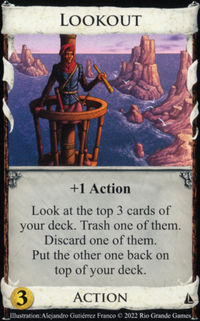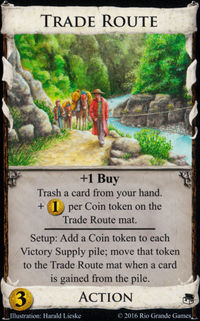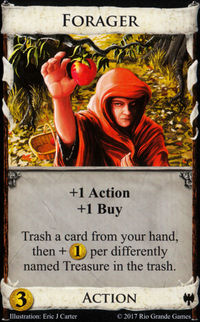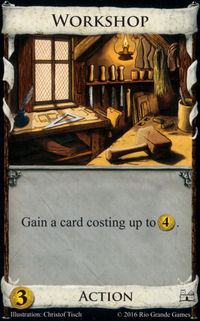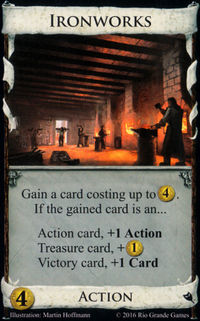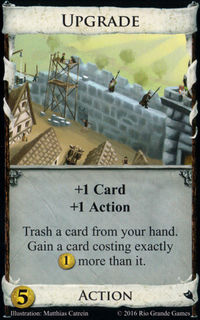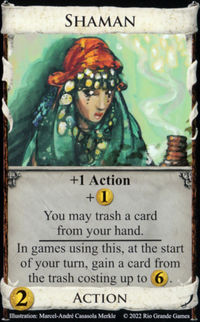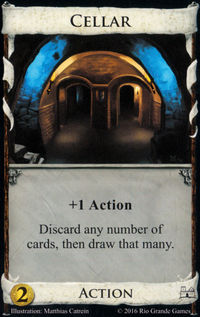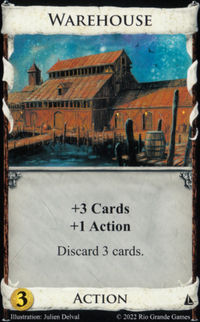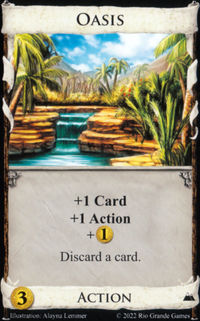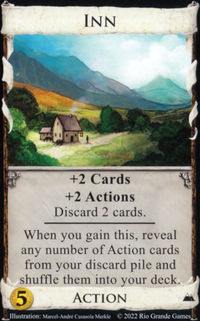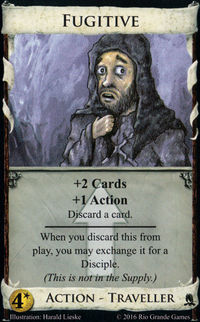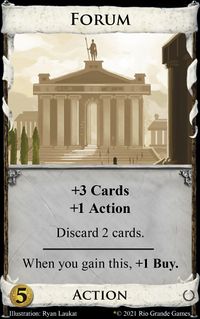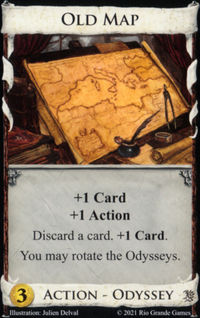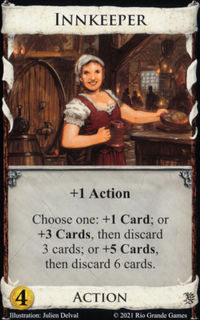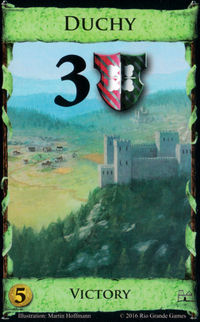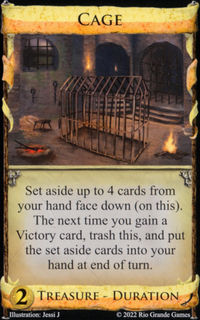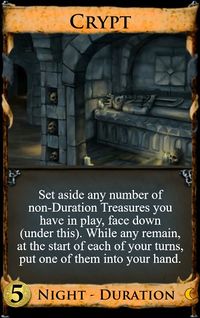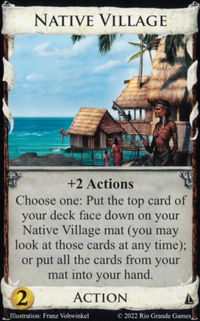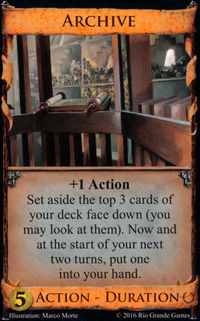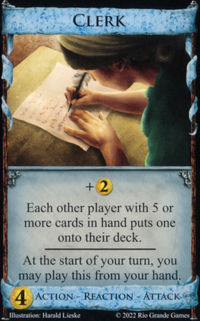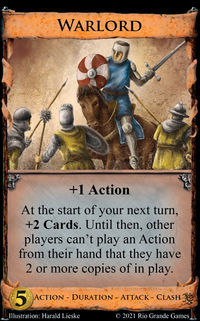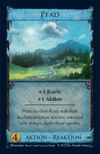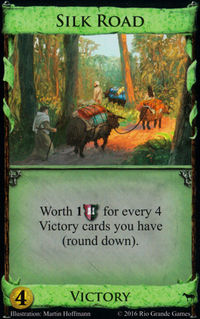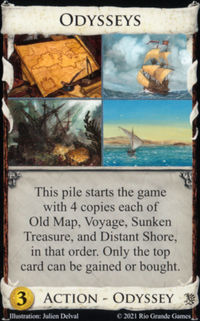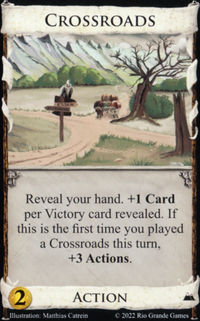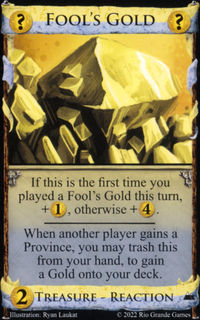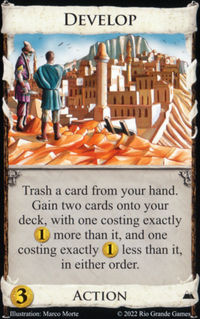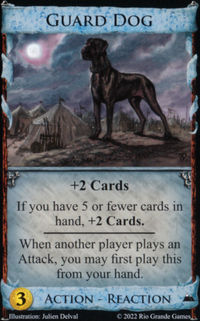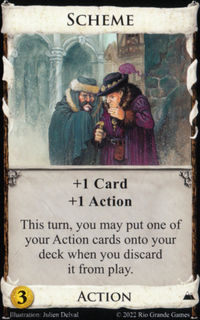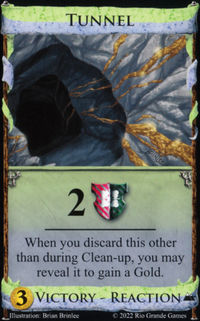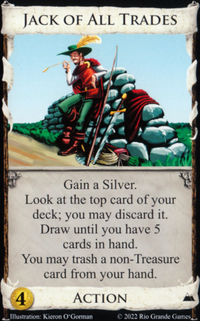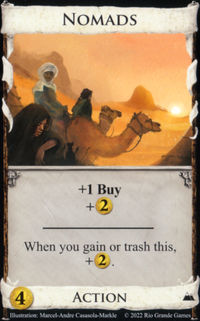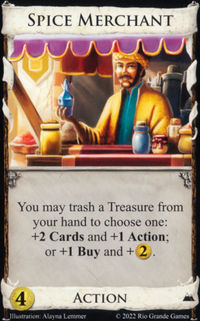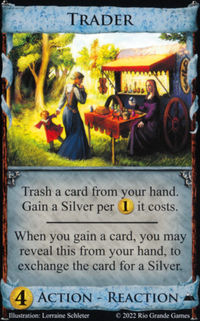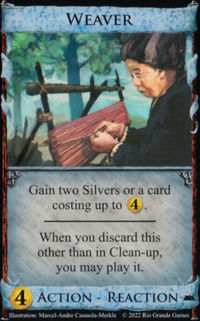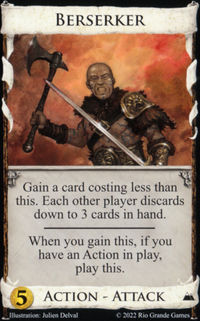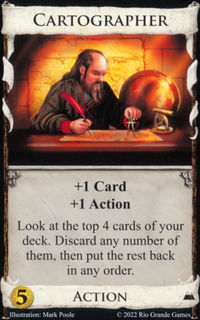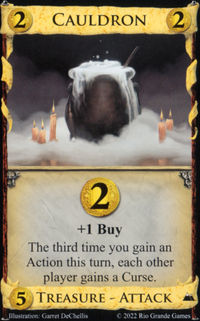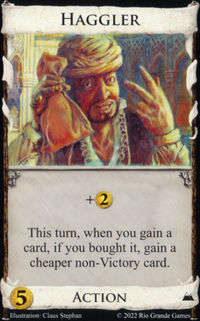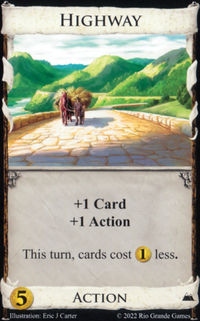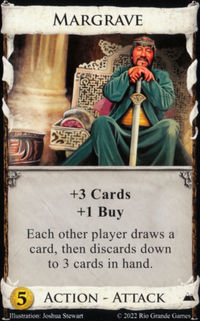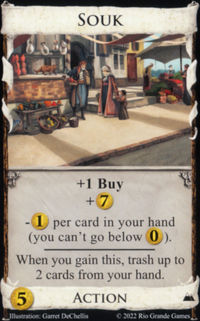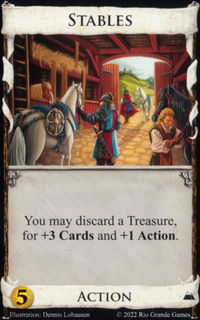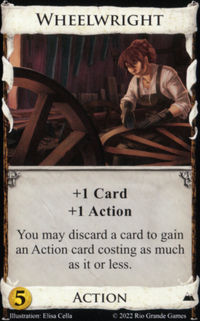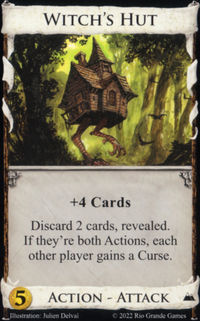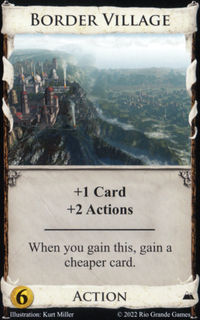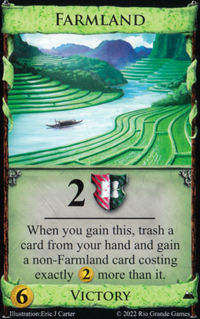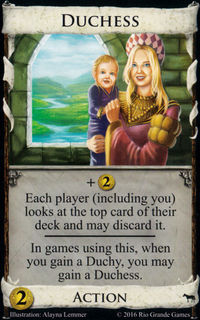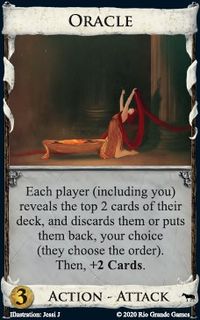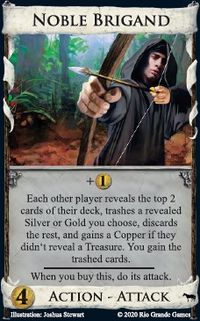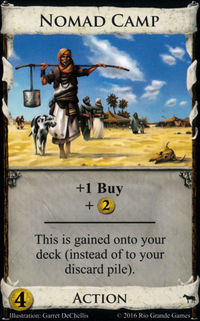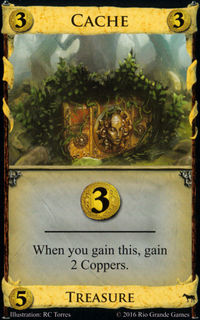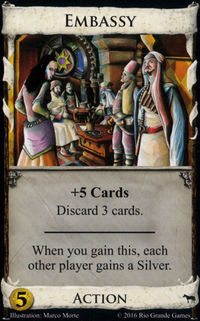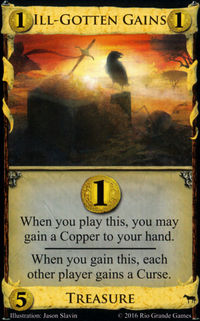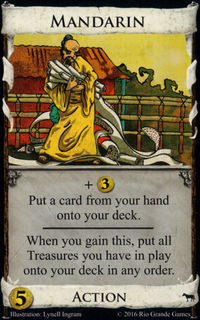Trail

|
This page is awaiting large-scale edits by the community to meet quality and format standards. The information on this page may be outdated. Join the #wiki-general channel on the Dominion Discord server to participate. |
| Trail | |
|---|---|
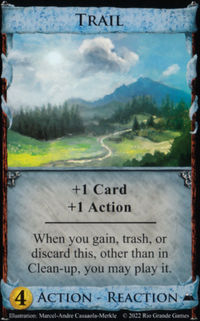 | |
| Info | |
| Cost | |
| Type(s) | Action - Reaction |
| Kingdom card? | Yes |
| Set |
Hinterlands |
| Illustrator(s) | Marcel-André Casasola Merkle |
| Card text | |
|
+1 Card +1 Action When you gain, trash, or discard this, other than in Clean-up, you may play it. | |
Trail is an Action-Reaction card from Hinterlands (Second Edition). When you play it, it is a cantrip with no other effect; what's interesting about Trail is when you can play it. In addition to playing it normally from your hand during your Action phase, you can play it immediately when you gain, trash, or discard it, enabling it to be used as a source of draw or +Action at unusual times. Playing it when you trash it also has the side effect of returning it to your custody from the trash, meaning it can be used as a renewable source of fodder for trash-for-benefit effects.
FAQ
Official FAQ
- When you play this, you simply get +1 Card and +1 Action.
- When you gain, trash, or discard this, other than in Clean-up, you may play it; see the When Discarded section.
- As usual playing it means putting it into play and following its instructions.
- If you play Trail on another player's turn, the +1 Action won't be useful, and you discard Trail from play in that turn's Clean-up.
- If you trash Trail, playing it means you get the Trail back; it will go into play, and be discarded into your discard pile in that turn's Clean-up.
- This still counts as trashing it; if you Remodel a Trail you can play it and then gain a Gold from Remodel, and so on.
Other rules clarifications
- If you gain or trash a Trail during Clean-up (with e.g. Improve), you can't use its Reaction.
- If you are instructed to discard down to a specific number of cards in hand (for instance, Militia making you discard down to three), first you discard your cards; then you may play any Trails you discarded, which will increase your handsize again. You don't have to continue discarding to get back down to 3 cards after playing your Trails; the discard has already been fully resolved by that point. (If you're hit by another discard attack after playing your Trails, of course then you'll need to discard again.)
- If you discard or trash multiple Trails at once, you still react with them one at a time. If you discard multiple Trails and play one of them, and playing it causes you to reshuffle your discard pile, then the stop-moving rule prevents you from playing the other Trails you discarded.
Strategy
Trail, on its own, is nearly useless and may even be detrimental (such as with terminal draw), and it is also very expensive relative to its effect, but it has powerful combos with other cards. Because it can be triggered by gaining, discarding, and trashing, it combines favorably with such a large portion of cards that the mere presence of Trail on a board completely changes the game dynamic more often than not. It has many different uses and interactions. It tends to be a strong card on average, and rewards cleverness, skill, and creativity.
One great function of Trail is that it can protect your deck from unwanted mandatory trashing: cards like Lookout, Trade Route, or Forager that have forced trashing can put you in an awkward situation if you have no undesireable cards to trash. Trail can provide a target that will not actually be permanently trashed, instead being played, thus providing a double benefit of +1 Card +1 Action, with avoiding unwanted trashing.
Trail also obviously synergizes with trash for benefit cards, as it can be trashed repeatedly, not only without being trashed, but while providing an additional benefit.
There is also a powerful synergy with gainers, with Trail turning terminal gainers such as Workshop into a non-terminal gainers that also draw a card. This greatly facilitates engine construction. The presence of Trail is one of the few times when Workshop is more appealing than the usually much-stronger Ironworks, mainly due to its lower price point, allowing two to be purchased in the opening.
The interaction with remodelers is particularly strong as these cards are both trashers and gainers, thus providing two different ways Trail can be triggered. For example, the normally-weak Remodel becomes quite strong in the presence of Trail: it can trash an estate to gain Trail, triggering it and thus becoming non-terminal and replenishing one card to the hand. Or it can trash a Trail to gain something costing up to , and having the same effect. Or you can trash a Trail to gain another Trail, thus playing both cards and generating +2 Cards +2 Actions.
Perhaps the best use of Trail is that it can create an engine out of a combination of cards that would normally not make a viable engine due to the lack of +Actions and inadequate draw. Trail can turn a terminal action that triggers trashing or discarding into a non-terminal action, and it effectively turns a non-terminal trasher or sifter (i.e. any card giving +1 Action) into a village, because it is played as a reaction triggered by the other card, and thus does not use up an action. Thus its +1 Action results in a net gain of +2 Actions with the other card. On top of this, it is effectively giving a bonus +1 Card draw without having to eat an action. Cards synergizing with Trail in this way include Lookout, Upgrade, Shaman, Cellar, Warehouse, Oasis, Inn, Fugitive, Forum, Old Map, and Innkeeper. Even when villages are present, the presence of Trail can speed engine construction by making the trashers themselves part of the engine: first you thin the deck, but less additional card buying or gaining is required because the trasher then becomes a source of +Card and +Action when combined with Trail.
Upgrade is a particularly powerful card in these engines, as it already gives +1 Card and +1 Action, it can "trash" Trail repeatedly to generate cards costing , and it can also trigger Trail by gaining it after trashing a card costing . In both cases the play yields a net gain of +0 Cards and +2 Actions. Upgrade can also thin out copper, albeit with no other benefit. Such an engine can gain many cards in one turn. When multiple players play such strategies, the game often ends on piles, leading a rush strategy such as one going for Duchy to be viable.
Trail can be a weak counter to some attacks, especially when you have a high density of it in your deck. It replaces itself in the case of a discard attack, but may leave you vulnerable to a discard attack. Its usefulness to this end is thus heavily dependent on the number of players: in a two-player game it is a decent counter to Militia and other typical discard attacks, but in a 4-player game with multiple players playing these attacks, it becomes weak.
There are fewer cards that do not synergize with Trail, but there are some. Alt-treasure combines poorly with it, because it tends to trigger it after the action phase is completed, when its +Action provides little benefit. Pseudo-trashing or cards with a set-aside dynamic, such as Cage, Crypt, Native Village, or Archive trigger it neither on setting aside nor returning it to the hand. In general it does not synergize as well with other cards providing draw: Trail-based engines usually work best when the draw is triggered by Trail combining with some other cards. Terminal draw risks drawing Trail dead, and the act of drawing Trail into your hand turns it into just-any cantrip, which weakens it. Although Trail is strong when combined with other cards, a -cost cantrip that does nothing else is inefficient, so any time you are drawing a trail into your hand and not discarding or trashing it, is a time your play is inefficient.
Attacks that force players to return cards to the top of the deck also do not trigger it, so Clerk can be an effective counter or attack against it. Warlord can sometimes harm Trail-based engines by limiting the number of times it can be played from the hand, although this depends on the nature of the engine: Warlord cannot prevent Trail from being triggered if it is trashed or discarded, so if your engine contains a diverse mix of actions to trigger Trail in different ways, it can have some resilience to Warlord. Trail also does not always fare well against junking attacks, although it can sometimes handle them in the presence of strong trashers.
Versions
English versions
| Digital | Text | Release | Date | |
|---|---|---|---|---|
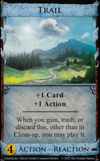 |
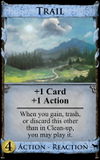 |
+1 Card +1 Action When you gain, trash, or discard this, other than in Clean-up, you may play it. |
Hinterlands (Second Edition) | July 2022 |
Other language versions
Trivia
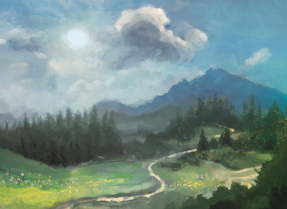
Preview
Trail is such a thing of beauty. It's like the most Hinterlandsy Hinterlands card. It plays into both the when-gain and filtering themes, and is a Reaction. You can imagine a board where there's no combo for it, but really it never happens.
Secret History
For strumphf's 2022 advent calendar, Donald X. went in-depth on the development of Trail.
Wording
